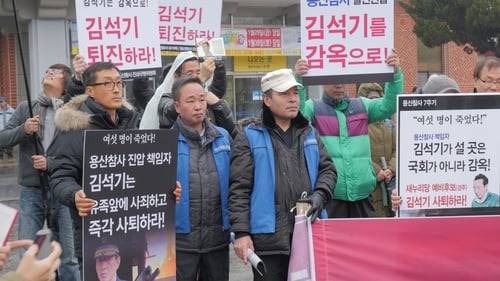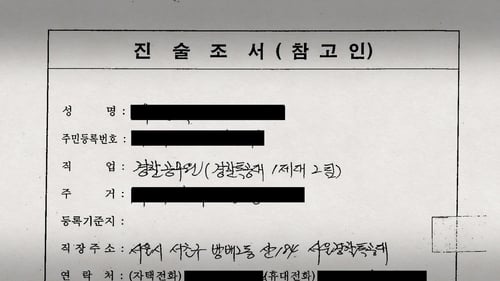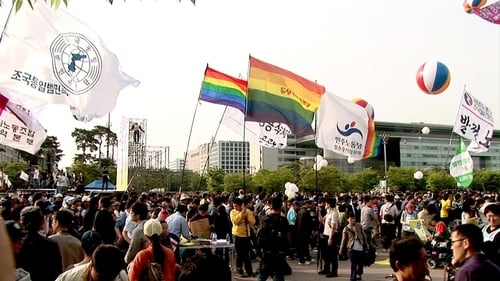
Producer
Nabi, a veteran fire officer, accepts the coming out from her child Hangyeol, “I want to remove my breasts.” Meanwhile, Vivian, a flight crew, receives a letter from her son Yejoon, “Mom, I’m gay.” Hangyeol and Yejoon confide in their struggles even before the two mothers understand their reality.

Producer
In October 2015, the evicted residents who had imprisoned on a false charge of killing a policeman assembled in a place for the first time after the Yongsan Disaster six years ago. They had occupied a watchtower against unreasonable redevelopment policies and in protest against violent suppression used by riot police in 25 hours of their sit-in demonstration. Their colleagues had died from an unknown fire, and they became criminals. The delight of meeting again lasts only briefly. The ‘comrades’ rip out cruel words while blaming each other.

Editor
In October 2015, the evicted residents who had imprisoned on a false charge of killing a policeman assembled in a place for the first time after the Yongsan Disaster six years ago. They had occupied a watchtower against unreasonable redevelopment policies and in protest against violent suppression used by riot police in 25 hours of their sit-in demonstration. Their colleagues had died from an unknown fire, and they became criminals. The delight of meeting again lasts only briefly. The ‘comrades’ rip out cruel words while blaming each other.

Director
In October 2015, the evicted residents who had imprisoned on a false charge of killing a policeman assembled in a place for the first time after the Yongsan Disaster six years ago. They had occupied a watchtower against unreasonable redevelopment policies and in protest against violent suppression used by riot police in 25 hours of their sit-in demonstration. Their colleagues had died from an unknown fire, and they became criminals. The delight of meeting again lasts only briefly. The ‘comrades’ rip out cruel words while blaming each other.

Editor
Nora Noh, the best fashion designer, who dominated the scene of Korean women’s fashion and culture of the time. She was the first person ever to hold a fashion show in Korea and to make designer readymade clothes. She boldly dressed the Korean singer Yoon Bok-hee in a miniskirt and styled the duo vocal group Pearl Sisters in pantallong (flare-style pants). One day, when Noh was preparing for her show, a young stylist named Suh Eun-young comes to see her out of the blue. What kind of show will the two of them create amidst their differences and conflicts?

Writer
Nora Noh, the best fashion designer, who dominated the scene of Korean women’s fashion and culture of the time. She was the first person ever to hold a fashion show in Korea and to make designer readymade clothes. She boldly dressed the Korean singer Yoon Bok-hee in a miniskirt and styled the duo vocal group Pearl Sisters in pantallong (flare-style pants). One day, when Noh was preparing for her show, a young stylist named Suh Eun-young comes to see her out of the blue. What kind of show will the two of them create amidst their differences and conflicts?

Editor
The documentary Two Doors traces the Yongsan Tragedy of 2009, which took the lives of five evictees and one police SWAT unit member. Left with no choice but to climb up a steel watchtower in an appeal to the right to live, the evictees were able to come down to the ground a mere 25 hours after they had started to build the watchtower, as cold corpses. And the surviving evictees became lawbreakers. The announcement of the Public Prosecutors’ Office that the cause of the tragedy lay in the illegal and violent demonstration by the evictees, who had climbed up the watchtower with fire bombs, clashed with voices of criticism that an excessive crackdown by government power had turned a crackdown operation into a tragedy.

Writer
The documentary Two Doors traces the Yongsan Tragedy of 2009, which took the lives of five evictees and one police SWAT unit member. Left with no choice but to climb up a steel watchtower in an appeal to the right to live, the evictees were able to come down to the ground a mere 25 hours after they had started to build the watchtower, as cold corpses. And the surviving evictees became lawbreakers. The announcement of the Public Prosecutors’ Office that the cause of the tragedy lay in the illegal and violent demonstration by the evictees, who had climbed up the watchtower with fire bombs, clashed with voices of criticism that an excessive crackdown by government power had turned a crackdown operation into a tragedy.

Director of Photography
A story about 4 gay men who try to lead a normal life in Korea, the conservative and harsh country for LGBT in Asia. In the middle of making a queer film Jun-moon, a director, loses his self-confidence due to social scrutiny regarding his sexual orientation. Byung-gwon, a gay rights activist, has been participating in movements to establish equal rights for homosexual laborers. Young-soo, a chef who moved from the countryside 15 years ago, lived a lonely life but he finds happiness after joining a gay choir. Yol, who works for a major company, dreams of the day him and his partner, can have a legal wedding with overcoming the prejudice against people living with HIV/AIDS.

Editor
A story about 4 gay men who try to lead a normal life in Korea, the conservative and harsh country for LGBT in Asia. In the middle of making a queer film Jun-moon, a director, loses his self-confidence due to social scrutiny regarding his sexual orientation. Byung-gwon, a gay rights activist, has been participating in movements to establish equal rights for homosexual laborers. Young-soo, a chef who moved from the countryside 15 years ago, lived a lonely life but he finds happiness after joining a gay choir. Yol, who works for a major company, dreams of the day him and his partner, can have a legal wedding with overcoming the prejudice against people living with HIV/AIDS.

Director
A story about 4 gay men who try to lead a normal life in Korea, the conservative and harsh country for LGBT in Asia. In the middle of making a queer film Jun-moon, a director, loses his self-confidence due to social scrutiny regarding his sexual orientation. Byung-gwon, a gay rights activist, has been participating in movements to establish equal rights for homosexual laborers. Young-soo, a chef who moved from the countryside 15 years ago, lived a lonely life but he finds happiness after joining a gay choir. Yol, who works for a major company, dreams of the day him and his partner, can have a legal wedding with overcoming the prejudice against people living with HIV/AIDS.

Director of Photography
The title refers to three “female-to-male” men. Ko has been taking hormones for 8 years in the belief that he must become completely “masculine” to be accepted; Han has her breasts removed as part of a process of becoming “ungendered”; while Kim finds that his new male legal identity only opens up new confusions.

Director of Photography
A documentary that tells the story of Choi Hyun-sook, the first out lesbian parliamentarian candidate in Korea who ran for Jongno-gu in the April 2008 National Assembly election. It's a story about people who dream of a world where minorities are happy, and who, with expectation and aspiration, find the campaign headquarters and made an election with Choi Hyun-sook.

Director of Photography
Meet Aunt Yang-hee, who has lived as a woman in a camp village. Several voices are heard around the base village, which is serving as a warehouse for American men by the ROK-U.S. alliance. But buried in those voices, it was difficult to hear the voices of the women in the camp village.

Editor
Meet Aunt Yang-hee, who has lived as a woman in a camp village. Several voices are heard around the base village, which is serving as a warehouse for American men by the ROK-U.S. alliance. But buried in those voices, it was difficult to hear the voices of the women in the camp village.













